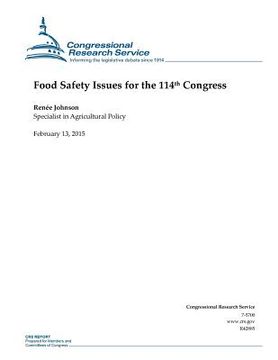Reseña del libro "Food Safety Issues for the 114th Congress (en Inglés)"
Congress passed comprehensive food safety legislation in December 2010 (FDA Food Safety Modernization Act [FSMA], P.L. 111-353), representing the largest expansion and overhaul of U.S. food safety authorities since the 1930s. FSMA greatly expanded food safety oversight authority at the Food and Drug Administration (FDA), within the U.S. Department of Health and Human Services (HHS), but did not alter oversight authorities within other federal agencies responsible for food safety, such as the U.S. Department of Agriculture (USDA). Given challenges facing FDA in implementing this law and also a continued prevalence of food safety incidents, Congress continues to actively address concerns of the U.S. food safety system. Numerous agencies share responsibility for regulating food safety; however, FSMA focused on FDA-regulated foods and amended FDA's existing structure and authorities, in particular the Federal Food, Drug, and Cosmetic Act (FFDCA; 21 U.S.C. 301 et seq.). Among its many provisions, FSMA expanded FDA's authority to conduct a mandatory recall of contaminated food products, enhanced surveillance systems for foodborne illness outbreaks, established preventive controls at some food processing facilities and farms, enhanced FDA's traceability capacity within the nation's food distribution channels, increased the number of FDA inspections at domestic and foreign food facilities, and expanded FDA's authority and oversight of foreign companies that supply food imports to the United States. Since the law was signed in January 2011, FDA has been actively engaged in developing regulations to implement FSMA. Congress will likely continue to monitor FDA's implementation of the law and provide oversight over how some provisions are carried out and enforced, as well as FDA's coordination with other federal agencies, such as those in USDA and the Department of Homeland Security. Under FSMA, FDA is responsible for more than 50 regulations, guidelines, and studies; however, some FDA rules under FSMA have been substantially delayed, and it is uncertain whether full implementation of some provisions in the law will meet their expected deadlines. Regulations were to have been proposed or, in some cases, finalized within one to two years of enactment (roughly January 2012 and January 2013). Given delays in the rulemaking process, the Center for Food Safety filed suit in federal court against FDA and the Office of Management and Budget (OMB), citing the government's failure to implement several food safety regulations required by FSMA. By early 2014, FDA had proposed a majority of the regulations that constitute the food safety framework under FSMA, but there are continued delays in some rules, industry guidance, and reports as required under the law. FDA also re-proposed some aspects of four major proposed rules in September 2014. FDA has agreed to a new court-ordered schedule for issuing final FSMA regulations for many of the major rules between 2015 and 2016. Congress may also continue to consider changes to other food safety laws and policies that continue to be actively debated. Among these are food safety initiatives covering meat, poultry, and seafood products; legislation intended to curtail the non-medical use of antibiotics in animal feeds and to ban the use of certain plastic components commonly used in food containers; food labeling; stricter food safety enforcement mechanisms; and the use of plant and animal biotechnology. Several of these issues were actively debated leading up to the passage of FSMA. Several bills debated in previous Congresses were reintroduced in the 112th and 113th Congress. Some in Congress also might continue to advocate for additional policy reforms to existing FDA or USDA food safety laws to address other perceived concerns about the safety of the U.S. food supply.

